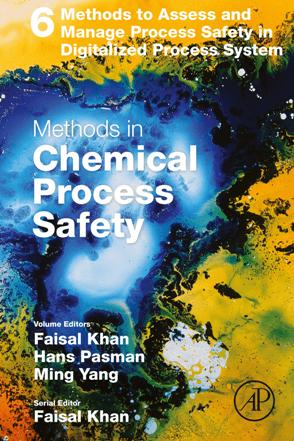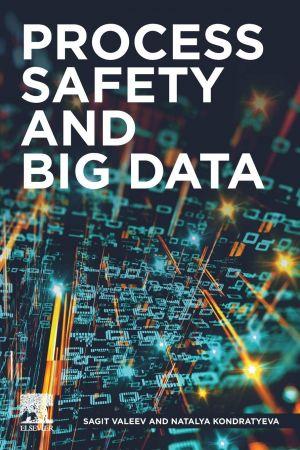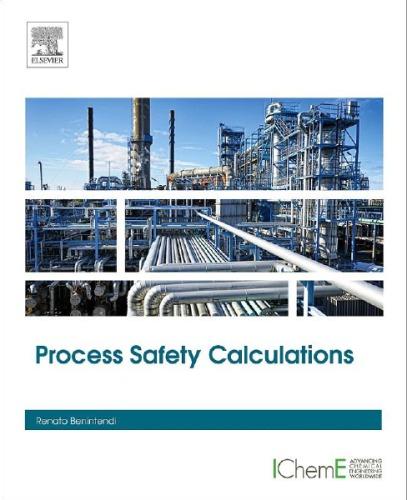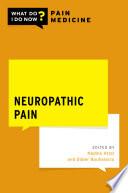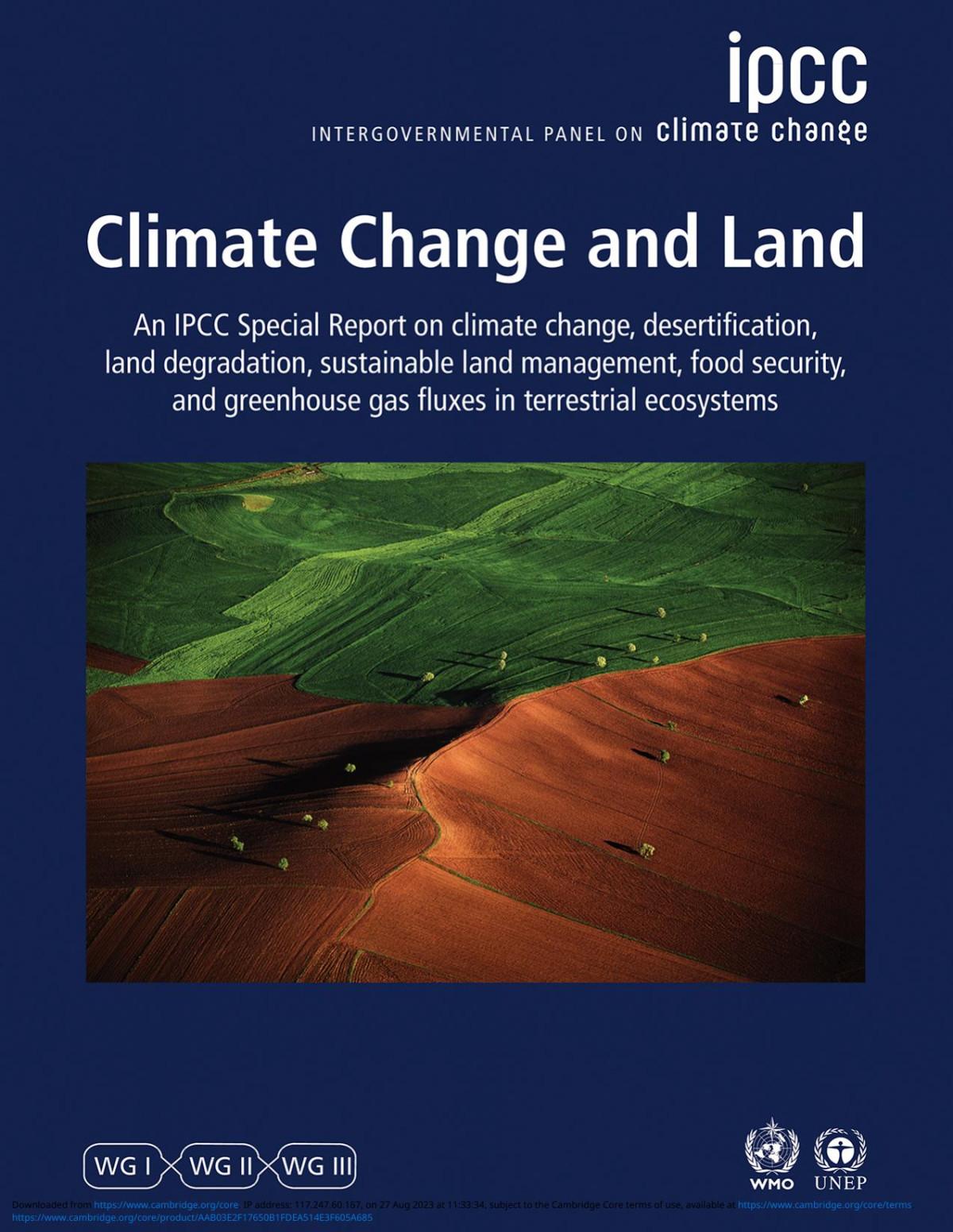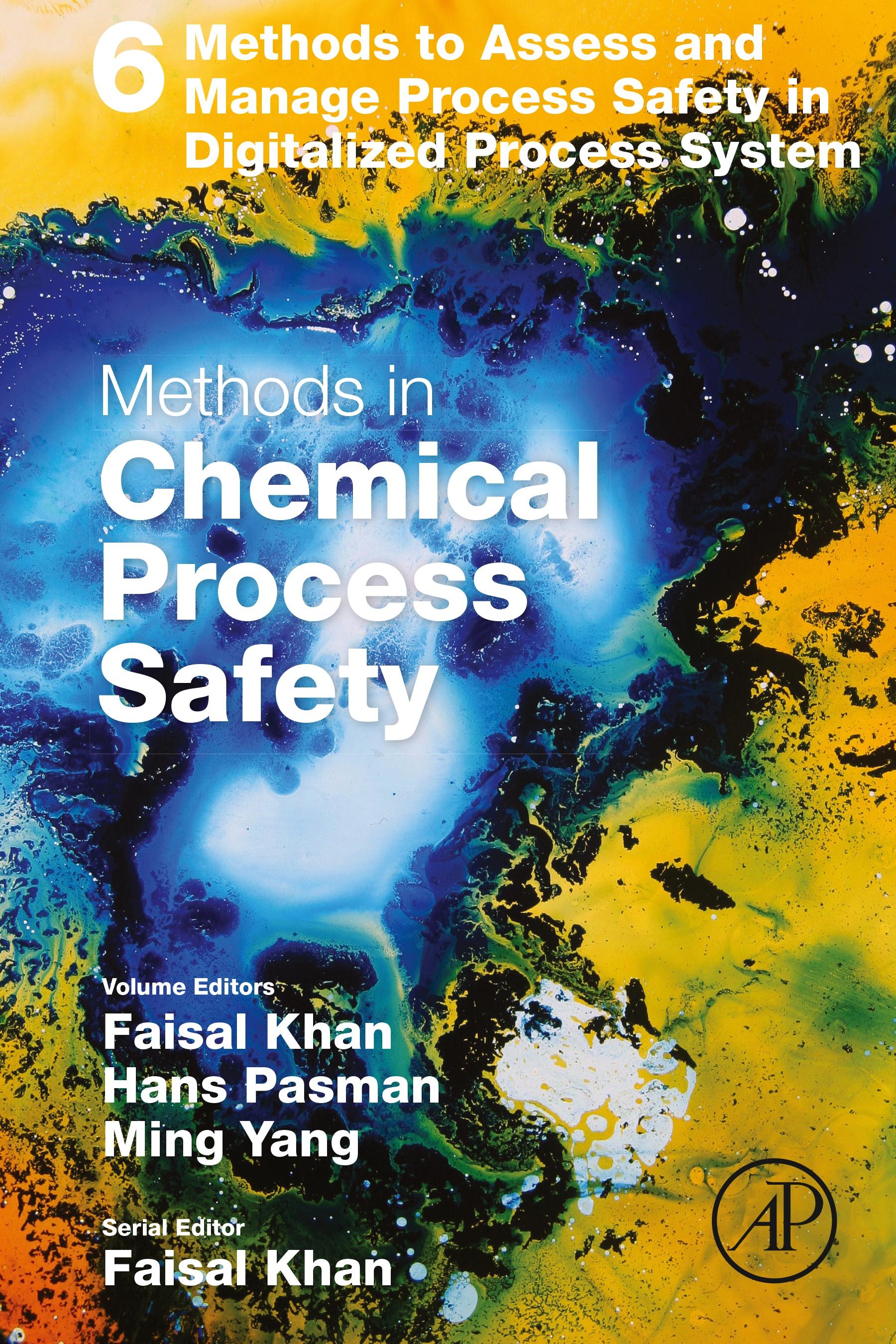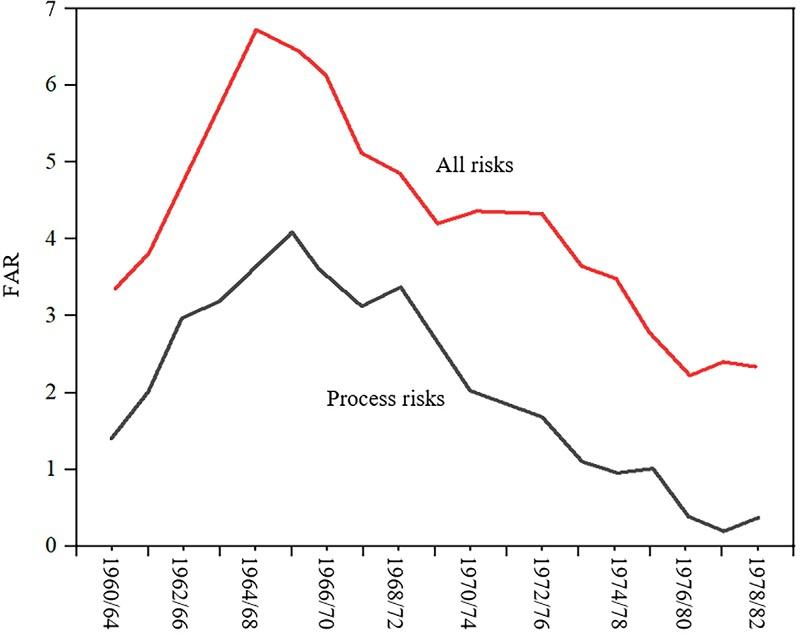Nanotechnology
https://ebookmass.com/product/nanotechnology-in-the-automotiveindustry-ghulam-yasin/
ebookmass.com
CHEMICALPROCESS
SAFETY
MethodstoAssessandManageProcess
SafetyinDigitalizedProcessSystem
METHODSIN
CHEMICALPROCESS
SAFETY
MethodstoAssessandManageProcess SafetyinDigitalizedProcessSystem
Editedby FAISALKHAN
MaryKayO’ConnorProcessSafetyCenter,ArtieMcFerrin DepartmentofChemicalEngineering,TexasA&MUniversity; TEESMaryKayO’ConnorProcessSafetyCenter,TexasA&M UniversitySystem,CollegeStation,TX,UnitedStates
HANSPASMAN
MaryKayO’ConnorProcessSafetyCenter,ArtieMcFerrin DepartmentofChemicalEngineering,TexasA&MUniversity; TEESMaryKayO’ConnorProcessSafetyCenter,TexasA&M UniversitySystem,CollegeStation,TX,UnitedStates
MINGYANG
SafetyandSecurityScienceSection,DepartmentofValues, Technology,andInnovation,FacultyofTechnology, Policy,andManagement,DelftUniversityofTechnology, Delft,TheNetherlands
AcademicPressisanimprintofElsevier
50HampshireStreet,5thFloor,Cambridge,MA02139,UnitedStates 525BStreet,Suite1650,SanDiego,CA92101,UnitedStates TheBoulevard,LangfordLane,Kidlington,OxfordOX51GB,UnitedKingdom 125LondonWall,London,EC2Y5AS,UnitedKingdom
Firstedition2022
Copyright©2022ElsevierInc.Allrightsreserved.
Nopartofthispublicationmaybereproducedortransmittedinanyformorbyanymeans,electronic ormechanical,includingphotocopying,recording,oranyinformationstorageandretrievalsystem, withoutpermissioninwritingfromthepublisher.Detailsonhowtoseekpermission,further informationaboutthePublisher’spermissionspoliciesandourarrangementswithorganizationssuch astheCopyrightClearanceCenterandtheCopyrightLicensingAgency,canbefoundatourwebsite: www.elsevier.com/permissions.
Thisbookandtheindividualcontributionscontainedinitareprotectedundercopyrightbythe Publisher(otherthanasmaybenotedherein).
Notices
Knowledgeandbestpracticeinthisfieldareconstantlychanging.Asnewresearchandexperience broadenourunderstanding,changesinresearchmethods,professionalpractices,ormedical treatmentmaybecomenecessary.
Practitionersandresearchersmustalwaysrelyontheirownexperienceandknowledgeinevaluating andusinganyinformation,methods,compounds,orexperimentsdescribedherein.Inusingsuch informationormethodstheyshouldbemindfuloftheirownsafetyandthesafetyofothers,including partiesforwhomtheyhaveaprofessionalresponsibility.
Tothefullestextentofthelaw,neitherthePublishernortheauthors,contributors,oreditors,assume anyliabilityforanyinjuryand/ordamagetopersonsorpropertyasamatterofproductsliability, negligenceorotherwise,orfromanyuseoroperationofanymethods,products,instructions,orideas containedinthematerialherein.
ISBN:978-0-323-98897-1
ISSN:2468-6514
ForinformationonallAcademicPresspublications visitourwebsiteat https://www.elsevier.com/books-and-journals
Publisher: ZoeKruze
AcquisitionsEditor: JasonMitchell
DevelopmentalEditor: NaizaErminMendoza
ProductionProjectManager: VijayarajPurushothaman
CoverDesigner: MilesHitchen
TypesetbySTRAIVE,India
Contributorsxi
Preface
1.Opportunitiesandthreatstoprocesssafetyindigitalizedprocess systems Anoverview1
HansPasman,HaoSun,MingYang,andFaisalKhan
1. Definitionofdigitalprocess,digitalization,andsafety1
2. Briefhistoryofprocesssafetyandreasonswhydigitalizationcansupport processsafety4
3. Processsafetytreatedindigitalizedprocesssystems13
4. PurposeandorganizationofthisMCPSVolume618 References19
2.State-of-the-artinprocesssafetyanddigitalsystem25
MdTanjinAmin,RajeevanArunthavanathan,MdAlauddin,andFaisalKhan
1. Background25
2. Currentprogressindigitalprocesssafety34
3. Afutureroadmapindigitalprocesssafety41 References49 Furtherreading59
3.Data-drivenapproaches:Useofdigitizedoperationaldatain processsafety61
YimingBai,ShuaiyuXiang,ZehengZhao,BoruiYang,andJinsongZhao
1. Importanceofdatainprocesssafety61
2. Datasource63
3. Datapreparationstages65
4. Data-drivenmodelforprocesssafety70
5. Applicationsofdata-drivenmodels75
6. Summaryandperspective87 References88
4.Industry4.0basedprocessdataanalyticsplatform101 ThumeeraR.Wanasinghe,MihiranGalagedarageDon, RajeevanArunthavanathan,andRaymondG.Gosine
1. Abriefoverviewforindustrialrevolution101
2. Overviewofprocessdataanalyticplatforms&Industry4.0102
3. Hardwareandsensinglayer105
4. Datamanagementlayer110
5. Networkinglayer122
6. Applicationlayer126
7. Cybersecurity131
8. Summary132 References133
5.Digitalprocesssafetymanagement139
MarkSlezak,StewartBehie,andHansPasman
1. Introduction139
2. Basicdigitalconcepts141
3. Thecasefordigitalprocesssafetymanagement143
4. ApplicationofdigitaltechnologiesinPSM146
5. Futureimprovementsinprocesssafetythroughdigitaltechnology:Limited literaturesurvey172
Acknowledgment176 References176
6.Statisticalapproachesandartificialneuralnetworksforprocess monitoring179
MdAlauddin,RajeevanArunthavanathan,MdTanjinAmin,andFaisalKhan
1. Introduction179
2. Statisticalprocessmonitoring192
3. Artificialneuralnetworkforprocessmonitoring202
4. Conclusions211 References211 Furtherreading226
7.Alarmmanagementtechniquestoimproveprocesssafety227
FanYang,JiandongWang,MohsenAsaadi,WenkaiHu,ZhenWang, andYinongZhang
1. Philosophyofalarmmanagement227
2. Conventionalalarmsystemsvs.advancedalarmsystems231
3. Conventionalalarmmanagementtechniqueswithimprovements232
4. Advancedalarmmanagementtechniques249
5. Applicationsofalarmmanagement274
6. Conclusions277 References278
8.Performanceevaluationofdigitalizedsafetybarriers281
AiboZhangandYiliuLiu
1. Introduction281
2. Failureandoperationalanalysisofsafetybarriers282
3. Measuresforperformanceevaluation285
4. Modelingapproaches287
5. Integrityanalysisandevaluationofsafetybarriers296
6. Digitaltwinapproachforcondition-basedevaluationandprognosis301
7. Closureandfurtherreading305 References306
9.Dynamicoperationalriskassessmentinprocesssafety management309
XinhongLi,LuyaoZhang,FaisalKhan,andGuomingChen
1. Necessityofdynamicriskassessment309
2. Dynamicriskassessmentmethodology311
3. CaseStudy1:Dynamicriskassessmentofsubseapipelineleak325
4. CaseStudy2:Dynamicpredictionofsubseapipelinescorrosion degradation339
5. Conclusions349 References349
10.Riskofcascadingeffectsindigitalizedprocesssystems353
MatteoIaiani,AlessandroTugnoli,andValerioCozzani
1. Introduction353
2. Definitionofcascadingevent357
3. Specificcausesofcascadingeventsindigitalizedprocesssystems359
4. Layersofprotection(LOP)inchemicalandprocessfacilities365
5. Unintentionalcascadingeffectsindigitalizedprocesssystems368
6. Intentionalcascadingeventsindigitalizedprocesssystems371
7. Conclusions383 References384
11.Uncertaintymodelinginriskassessmentofdigitalizedprocess systems389
MohammadYazdi,EsmaeilZarei,SidumAdumene,RouzbehAbbassi, andPayamRahnamayiezekavat
1. Introduction389
2. Thedefinitionofuncertainty391
3. Reviewingthecategoryofuncertainty393
4. Uncertaintycontributors397
5. Uncertaintypropagation401
6. Conclusion:Challengesandfuturedirection409 Reference409
12.Humanfactorsindigitalizedprocessoperations417 RajagopalanSrinivasan,BabjiSrinivasan,andMohdUmairIqbal
1. Introduction417
2. Humanfactors420
3. Humanerrors426
4. Humanerrorreductionindigitalizedoperations443
5. Summary454 References454
13.Safetyassessmentofcomplexsocio-technicalsystems461 NicolaPaltrinieri
1. Introduction461
2. ExamplesofAI-basedprediction463
3. Method469
4. Resultsanddiscussion472
5. Conclusion475 References475
14.Securityofdigitalizedprocesssystems479 AhmedHamdyEl-Kady,SyedaHalim,HansPasman,andFaisalKhan
1. Introduction479
2. Reviewofphysicalandcyberthreatsindigitalizedprocesssystems480
3. Reviewofphysicalandcyberdefense/protectionmeasures487
4. Conclusions503
Appendix:Principlesofgametheoryandwhyitcancontributetosecurity505 References512
15.Integrateddynamicriskmanagementinprocessplants525 MohammedTaleb-BerrouaneandHansPasman
1. Generalintroduction525
2. Real-timeriskassessmentofprocessoperations526
3. Safetyvssecurityrisk533
4. Economicsofriskreduction;applicationsofLFs550
5. Progressandfutureopportunities554 References554 Furtherreading560
16.Useofdigitaltwinsforprocesssafetymanagement561 ArvindKeprateandNikhilBagalkot
1. Introductiontodigitaltwin561
2. Processsafetymanagementofsmall-borepiping566
3. Digitaltwinforsmallborepiping569
4. Illustrativecasestudy572
5. Conclusion587 References587
17.Resilienceanalysisofdigitalizedprocesssystems591 RiosharYarveisy,HaoSun,MingYang,andHansPasman
1. Whatisresilience?591
2. Whyseekresiliency?595
3. Howtoattainresilience?600
4. Resilienceassessmentmethods604
5. Conclusion624 References625
18.RiskassessmentinIndustry4.0631 MdTanjinAminandFaisalKhan
1. Introduction631
2. RiskassessmentandIndustry4.0639
3. Conclusionsandfuturedirections644 References645
Contributors
RouzbehAbbassi
SchoolofEngineering,FacultyofScienceandEngineering,MacquarieUniversity,Sydney, NSW,Australia
SidumAdumene
SchoolofOceanTechnology,MarineInstituteMemorialUniversityofNewfoundland,St. John’s,NL,Canada
MdAlauddin
CentreforRisk,IntegrityandSafetyEngineering(C-RISE),FacultyofEngineering& AppliedScience,MemorialUniversityofNewfoundland,St.John’s,NL,Canada
MdTanjinAmin
CentreforRisk,IntegrityandSafetyEngineering(C-RISE),FacultyofEngineering& AppliedScience,MemorialUniversityofNewfoundland,St.John’s,NL,Canada
RajeevanArunthavanathan
CentreforRisk,IntegrityandSafetyEngineering(C-RISE),FacultyofEngineering& AppliedScience,MemorialUniversityofNewfoundland,St.John’s,NL,Canada
MohsenAsaadi
DepartmentofAutomation,TsinghuaUniversity,Beijing,China
NikhilBagalkot
DepartmentofMechanical,ElectronicsandChemicalEngineering,OsloMetropolitan University,Norway
YimingBai
StateKeyLaboratoryofChemicalEngineering,DepartmentofChemicalEngineering, TsinghuaUniversity,Beijing,China
StewartBehie
TEESMaryKayO’ConnorProcessSafetyCenter,TexasA&MUniversitySystem,College Station,TX,UnitedStates
GuomingChen
CentreforOffshoreEngineeringandSafetyTechnology(COEST),ChinaUniversityof Petroleum(EastChina),Qingdao,China
ValerioCozzani
LISES-LaboratoryofIndustrialSafetyandEnvironmentalSustainability-Departmentof Civil,Chemical,EnvironmentalandMaterialsEngineering-DICAM,Universityof Bologna,Bologna,Italy
AhmedHamdyEl-Kady
MaryKayO’ConnorProcessSafetyCenter,ArtieMcFerrinDepartmentofChemical Engineering,TexasA&MUniversity,CollegeStation,TX,UnitedStates
MihiranGalagedarageDon
CentreforRisk,IntegrityandSafetyEngineering(C-RISE),FacultyofEngineering& AppliedScience,MemorialUniversityofNewfoundland,St.John’s,NL,Canada
RaymondG.Gosine
CentreforRisk,IntegrityandSafetyEngineering(C-RISE),FacultyofEngineering& AppliedScience,MemorialUniversityofNewfoundland,St.John’s,NL;InnovationPolicy Lab,MunkSchoolofGlobalAffairsandPublicPolicy,UniversityofToronto,Toronto,ON, Canada
SyedaHalim
MaryKayO’ConnorProcessSafetyCenter,ArtieMcFerrinDepartmentofChemical Engineering,TexasA&MUniversity,CollegeStation,TX,UnitedStates
WenkaiHu
SchoolofAutomation,ChinaUniversityofGeosciences,Wuhan,China
MatteoIaiani
LISES-LaboratoryofIndustrialSafetyandEnvironmentalSustainability-Departmentof Civil,Chemical,EnvironmentalandMaterialsEngineering-DICAM,Universityof Bologna,Bologna,Italy
MohdUmairIqbal
DepartmentofChemicalEngineering,IndianInstituteofTechnologyGandhinagar, Gandhinagar,India
ArvindKeprate
DepartmentofMechanical,ElectronicsandChemicalEngineering,OsloMetropolitan University,Norway
FaisalKhan
MaryKayO’ConnorProcessSafetyCenter,ArtieMcFerrinDepartmentofChemical Engineering,TexasA&MUniversity;TEESMaryKayO’ConnorProcessSafetyCenter, TexasA&MUniversitySystem,CollegeStation,TX,UnitedStates
XinhongLi
SchoolofResourcesEngineering,Xi’anUniversityofArchitectureandTechnology,Xi’an, China
YiliuLiu
DepartmentofMechanicalandIndustrialEngineering,NorwegianUniversityofScienceand Technology,Trondheim,Norway
NicolaPaltrinieri
NorwegianUniversityofScienceandTechnology – NTNU,Trondheim,Norway
HansPasman
MaryKayO’ConnorProcessSafetyCenter,ArtieMcFerrinDepartmentofChemical Engineering,TexasA&MUniversity;TEESMaryKayO’ConnorProcessSafetyCenter, TexasA&MUniversitySystem,CollegeStation,TX,UnitedStates
PayamRahnamayiezekavat
SchoolofEngineering,DesignandBuiltEnvironment,WesternSydneyUniversity,Penrith, NSW,Australia
MarkSlezak
OccidentalPetroleumCorporation,Houston,TX,UnitedStates
BabjiSrinivasan
DepartmentofAppliedMechanics;AmericanExpressLabforDataAnalytics,Risk& Technology,IndianInstituteofTechnologyMadras,Chennai,India
RajagopalanSrinivasan
DepartmentofChemicalEngineering;AmericanExpressLabforDataAnalytics,Risk& Technology,IndianInstituteofTechnologyMadras,Chennai,India
HaoSun
SafetyandSecurityScienceSection,DepartmentofValues,Technology,andInnovation, FacultyofTechnology,Policy,andManagement,DelftUniversityofTechnology,Delft, TheNetherlands;CollegeofMechanicalandElectronicEngineering,ChinaUniversityof Petroleum(EastChina),Qingdao,China
MohammedTaleb-Berrouane
CentreforRisk,IntegrityandSafetyEngineering(C-RISE),FacultyofEngineering& AppliedScience,MemorialUniversityofNewfoundland,St.John’s,NL,Canada
AlessandroTugnoli
LISES-LaboratoryofIndustrialSafetyandEnvironmentalSustainability-Departmentof Civil,Chemical,EnvironmentalandMaterialsEngineering-DICAM,Universityof Bologna,Bologna,Italy
ThumeeraR.Wanasinghe
CentreforRisk,IntegrityandSafetyEngineering(C-RISE),FacultyofEngineering& AppliedScience,MemorialUniversityofNewfoundland,St.John’s,NL,Canada
JiandongWang
CollegeofElectricalEngineeringandAutomation,ShandongUniversityofScienceand Technology,Qingdao,China
ZhenWang
CollegeofElectricalEngineeringandAutomation,ShandongUniversityofScienceand Technology,Qingdao,China
ShuaiyuXiang
StateKeyLaboratoryofChemicalEngineering,DepartmentofChemicalEngineering, TsinghuaUniversity,Beijing,China
BoruiYang
StateKeyLaboratoryofChemicalEngineering,DepartmentofChemicalEngineering, TsinghuaUniversity,Beijing,China
FanYang
DepartmentofAutomation,TsinghuaUniversity,Beijing,China
MingYang
SafetyandSecurityScienceSection,DepartmentofValues,Technology,andInnovation, FacultyofTechnology,Policy,andManagement,DelftUniversityofTechnology,Delft, TheNetherlands
RiosharYarveisy
C-RISE,MemorialUniversityofNewfoundland,St.John’s,NL,Canada
MohammadYazdi
CentreforRisk,Integrity,andSafetyEngineering(C-RISE),FacultyofEngineeringand AppliedScience,MemorialUniversityofNewfoundland,St.John’s,NL,Canada;Schoolof Engineering,FacultyofScienceandEngineering,MacquarieUniversity,Sydney,NSW, Australia
EsmaeilZarei
CentreforRisk,Integrity,andSafetyEngineering(C-RISE),FacultyofEngineeringand AppliedScience,MemorialUniversityofNewfoundland,St.John’s,NL,Canada
AiboZhang
DepartmentofAdvancedDesignandSystemsEngineering,CityUniversityofHongKong, KowloonTong,HongKong
LuyaoZhang
SchoolofResourcesEngineering,Xi’anUniversityofArchitectureandTechnology,Xi’an, China
YinongZhang CollegeofUrbanRailTransitandLogistics,BeijingUnionUniversity,Beijing,China
JinsongZhao
StateKeyLaboratoryofChemicalEngineering,DepartmentofChemicalEngineering; BeijingKeyLaboratoryofIndustrialBigDataSystemandApplication,TsinghuaUniversity, Beijing,China
ZehengZhao
StateKeyLaboratoryofChemicalEngineering,DepartmentofChemicalEngineering, TsinghuaUniversity,Beijing,China
Preface
Volume6ontheprocesssafetyaspectsofdigitalizationoftheprocessindustry isthelatestfruitofthe MethodsofChemicalProcessSafety bookseries.Where previousvolumesfocusedonestablishedmethods,includingtrendsandnew developments,thepresentvolumehaslittletolookbackoninthepast.In contrast,itisveryfutureoriented.Asmentionedinsomechapterintroductionsofthisvolume,theIndustry4.0revolutionhascausedaparadigmshiftof methods.Theterm“Industry4.0”wasfirstcoinedin2011,byWolfgang Wahlster,DirectorandCEOoftheGermanResearchCenterforArtificial Intelligence.ThetermobtainedworldwidefamewhenKlausSchwab,economistandengineer,founderandexecutivechairmanoftheWorldEconomic Forum,producedin2016thebook TheFourthIndustrialRevolution.Thiswas alsotheyeartheEuropeanbranchoftheCenterforChemicalProcessSafety organizeditsfirstconferenceinFrankfurtonbigdataandanalytics.Atthat conference,theroughcontoursofwhatwouldcomebecamevisible.Itdidn’t takelongwhentheterm“Industry4.0”wasfollowedbySafety4.0.Andthat wasnotwithoutreason.Predictionofhazardsandrisksforyearshadstruggled withlackofdata.Methodshadbeenthere,assystematicdevelopmentoftheoryandexperimentalmethodsonprocesssafetystartedafterWorldWarII, laterfollowedbysystem-orientedmethods,suchashazardandoperability study,and,inthelate1970s,riskassessment.Thelatterstimulatedfieldtrials anddevelopmentofcomputationalmethods,inparticularcomputationalfluid dynamics,topredictphysicaleffectsbutalsotosupportmaintenancevia risk-basedinspectionandother.However,theprobabilityofpossiblescenarios,equipmentfailure,andhumanerrorremaineddifficulttopredict.This waslargelyduetolackofpossibilityofmakingeffectiveuseofdatabases andthegenerationandprocessingofstatisticaldata.
Independently,andstartingevenmuchearlier,thedevelopmentof fundamentalknowledgeonhowtotreatobservationaldatastatistically focusedontheclassicalFisherapproachandthemorerecentversatile Bayesianone.Later,inthe1960sand1970s,theambitionofartificialintelligence(AI)withaviewonroboticdecision-makingstimulateddevelopmentthatbecameincreasinglystronger.Itledtoseveralproducts,suchas expertsystemsandcase-basedreasoning,butalsousinggraphtheoryand Pearl’scause-effectthinkingintheBayesiannetwork.Thelattercaused anupswinginriskassessmentasaresultofenablinguncertaintytobe
quantifiedinasimulatedcomplexcausalstructureleadingtoanunwanted event.Further,variousdataprocessingalgorithmsweredeveloped,inparticularoverthelastdecade,enablingclassificationofdatacontainingrandom noisewithmachinelearningtechniquesandpatternrecognitioninallitsdifferentformswiththeever-furtherdifferentiatingAItechniques.Atthesame time,computationalcapabilities(software,InternetofThings,cloudcomputing)andsensoravailabilityincreasedtremendously,whichenabled large-scaledigitalization.
Thissixthvolumeoftheseriesprovides,inaseriesofchapters,anoverviewofwhatthiswillmeanfortheprocessindustryinplantdesignandoperation,alsowithrespecttoeffectiveness,efficiency,andresilience.Withthe newtools,theperspectiveofobtainingdataenhancestheaccuracyofrisk models,enablingdynamicmonitoringofsafetyperformancelevelandof equipmentconditioninviewofmaintenance—especiallywithrespectto assetintegrityandbarriereffectiveness.Andfurther,thetoolsareenabling faultdetectionanddiagnosis,digitaltwindevelopmentthathelpsdesign, operationandoperatortraining,andacquiringsafetymanagementinformationsupportingrisk-informeddecision-making.
Aseveryadvantageisaccompaniedbysomechallenges,ourstrongreliance ontheworldwideinternetposessecuritythreatssuchasdatatheft,abuse,misleadinginformationandotherinterferences,anddisruption.Topreventand negatehackingandintruderaction,manynewtechniquesarebeingdeveloped.Theinteractionofcybersecuritywithprocesssafetyisbeinganalyzed.
Wearegratefultoalltheauthorswhohelpedtocreatethisvolume.They werepreparedtointerrupttheirresearchandeducationalworkinthisnew andfascinatingfieldtowriteachapter.Manyofthemhaveworkedunder quitesomestresstomeetthedeadlinebut,intheend,wemadeit.Wealso thanktheElsevierstaffwhohavebeenresponsivetoourtimingproblem.
FAISAL KHAN
TEESMaryKayO’ConnorProcessSafetyCenter
TexasA&MUniversitySystem,CollegeStation,TX,UnitedStates
HANS PASMAN
TEESMaryKayO’ConnorProcessSafetyCenter
TexasA&MUniversitySystem,CollegeStation,TX,UnitedStates
MING YANG
SafetyandSecurityScienceSection,DepartmentofValues, Technology,andInnovation,FacultyofTechnology,Policy,and Management,DelftUniversityofTechnology,TheNetherlands
Opportunitiesandthreats toprocesssafetyindigitalized processsystems—Anoverview
HansPasmana,*,HaoSunb,c,MingYangb,*,andFaisalKhana,*
aTEESMaryKayO’ConnorProcessSafetyCenter,TexasA&MUniversitySystem,CollegeStation,TX, UnitedStates
bSafetyandSecurityScienceSection,DepartmentofValues,Technology,andInnovation,Facultyof Technology,Policy,andManagement,DelftUniversityofTechnology,Delft,TheNetherlands cCollegeofMechanicalandElectronicEngineering,ChinaUniversityofPetroleum(EastChina), Qingdao,China
*Correspondingauthors:e-mailaddress:hjpasman@gmail.com;m.yang-1@tudelft.nl;fikhan@tamu.edu
Contents
1. Definitionofdigitalprocess,digitalization,andsafety1
2. Briefhistoryofprocesssafetyandreasonswhydigitalizationcansupportprocess safety4
2.1 Abriefhistoryofprocesssafety4
2.2 Whycandigitalizationsupportprocesssafety?10
3. Processsafetytreatedindigitalizedprocesssystems13
3.1 Humanandmanagementerrors13
3.2 Processmonitoringandcontrol14
3.3 Massivedataprocessing15
3.4 Cyber-attacks17
4. PurposeandorganizationofthisMCPSVolume618 References19
1.Definitionofdigitalprocess,digitalization,andsafety
Severaldevelopmentsintheprocessindustry,suchasoptimaluseof energy,morecomplexprocessesandprocessconditions,andlargerflexibilityforproductadaptation,withaworkforcethatismoremobile,askfora higherdegreeofautomation.Toadapttothischangeandensureproduction safety,digitaltechnologiesprovideapotentialwaytoimproveproduction efficiencyandreducethelikelihoodandseverityofindustrialaccidents.
Thefirstpushfordigitalcomputingintheprocessindustrycamein 1949throughIBM’sindustrialcomputingseminars(Lee,Cameron,&
MethodsinChemicalProcessSafety,Volume6Copyright # 2022ElsevierInc. ISSN2468-6514Allrightsreserved. https://doi.org/10.1016/bs.mcps.2022.05.007
Hassall,2019).Theexponentialincreasesincomputingpowerandsoftware developmentoverthepast70yearshavebeenthemainstayofthedevelopmentofhigh-fidelitydynamicmodelingofentireprocessplants(Leeetal., 2019). Fig.1 showsthemaindevelopmentoverthelast80years.
Digitaltechnologies,whicharethebreadandbutterofIndustry4.0,have beenusedinmanyfieldssuchasecology,economy,engineering,andprocesssystem(Single,Schmidt,&Denecke,2019).Acleardefinitionofdigital termsisthefirststepindeterminingitsopportunitiesandthreatsinprocess systems.
Digitalprocess referstothebasicprocessoftransformingmuchcomplex andchangeableinformationofawholesystemintonumbersanddatathat canbemeasuredandthenusingthesenumbersanddatatobuildanappropriatedigitalmodel,introducingthemintotheinternalcomputerforunified processing(Porthin,Liinasuo,&Kling,2020).Severalauthorshave expressedtheirviewsinthisregardintheavailableliterature.However, thereisnoaccepteddefinitionintheacademiccommunitysofar.There isagoodexampleinprocesssafetytodescribethedigitalprocess. Single etal.(2019) developedan“semi-automatedHAZOP”systemtosupport aHAZOPteamtoidentifypotentialhazardsofaprocessplant.TheinformationofProcessFlowDiagrams(PFDs)andPipingandInstrumentation Diagrams(P&IDs)isexactedandusedtorepresenttheprocessplant.The nodesinPFDsandP&IDscanbemodeledbyaspecificmodelinglanguage andagraphicaleditor.Inthelightofthis,deviationsinprocessvariablescan beautomaticallyappliedandpropagatedthroughtheprocesssystem, detectingpotentialfaultsandhazardouseventsbyemployinginference methods.Inthisprocess,allinformation,includingtheinformationofthe processplantandexpertknowledge,istransformedintodataprocessedby computers.
Digitization or digitalization isdefinedastheintegrationofdigitaltechnologiesinprocessoperationsforgreaterefficiencyandincreasedproductquality(Kayikci,2018; Khan,Amyotte,&Adedigba,2021; Vaidya,Ambad,& Bhosle,2018).Digitalizationgenerallymeansencodingvariousinformation (e.g.,images,voices,videos,data,etc.)intozerosandonesforbetterstorage, processing,andtransmissionofinformation(Khanetal.,2021).The digitalizationprocesscomprisestheincreaseduseofrobotics,automation solutions,andcomputerization,reducingcosts,improvingefficiencyand productivity,andrespondingflexiblytochanges.
Thedigitalizationinprocessindustriesconsistsoftwomainparts: (i)physicaldigitalization(i.e.,automationofequipment,holisticsimulation
Fig.1 Thedevelopmentofdigitalizationinprocesssystems. AdaptedfromLee,J.,Cameron,I.,&Hassall,M.(2019).Improvingprocesssafety: WhatrolesforDigitalizationandIndustry4.0? ProcessSafetyandEnvironmentalProtection,132,325–339.doi:10.1016/j.psep.2019.10.021.
ofprocesssystems),(ii)informationdigitalization(i.e.,automationofdata collection,processing,andanalysis).Inthefieldofprocesssafety,thelatter isofgreaterinterest(Leeetal.,2019).Theessenceofdigitalizationistouse theabundantdatainsystemstosolvetheuncertaintyofcomplexsystems. Digitalizationenablesdigitaltwin,whichfocusesonthesimulationofthe overallsystemtooptimizethesystemstructureandverifytheeffectiveness ofexistingoperatingstrategies,andcollecting,storing,andprocessingalarge amountofmonitoringdataandproductiondatageneratedinsystems.The mainreasonsforthegrowinginterestindigitalizationareexponential growthintechnologydevelopmentandthefactthatdataisbecomingricher frommoresources,real-timewithhigherdatarates,morecomplex,and moreuseful.
Digitalizationdependsondata,anddatareliesoneffectivecollection, andforreliableuse,datashouldbekeeptcybersecure,datapreparation andeffectiveanalysisisrequiredtodistilinformationfromthem,andin theend,theirvaluewouldshowupbyusefulapplication.Theanalysis focusesonidentifyingproblemsandanalyzingthembasedondataand themainreasonsbehindthegenerationofsuchdatatomonitortheoperationsandstatusofprocesssystemsanddevelopstrategiesandmeasuresfor optimization.
Safety intheprocessindustrycanbedefinedastheabilityorstateofa systemtobefreefromundesiredaccidentriskduringtheproductionprocess (e.g., Hollnagel,2008).Safetyandriskarecloselylinked.Riskisacomposite measureoftheprobabilityofanundesiredaccidentandthecorresponding consequences.Fromaconceptualpointofview,reducingtheaccidents’ probabilityandconsequencecandecreasesytemriskwhichwillimprove systems’safety.Earlywarning(Chang,Khan,&Ahmed,2011; Schmitz, Swuste,Reniers,&vanNunen,2020),faultdetectionanddiagnosis (Fazai,Mansouri,Abodayeh,Nounou,&Nounou,2019; Kopbayev, Faisal,Yang,&Halim,2022),andsafetybarriers(e.g.,physicalbarriers andnon-physicalbarriers)canbeusedtoimprovethesafetyofprocess systems. 2.Briefhistoryofprocesssafetyandreasonswhy
Processsystems,and,inparticular,chemicalonesstoreandprocessalarge amountofhazardousmaterials,whichbyexplosionblast,radiantheat,or
toxicsubstanceexposuremayleadtocasualties,propertydamages,andecologicalpollution(Abbassi,Khan,&Garaniya,2015;Benson,Dimopoulos, &Argyropoulos,2021; Khan,Wang,&Yang,2016; Sun,Haiqing,Yang,& Reniers,2021).Quiteafewcompilationsofaccidentsthatoccurredare available,e.g.,Marsh,100LargestLossesintheHydrocarbonindustry 1974–2019(Marsh,2020),whileseveralcountriesmaintainaccidentdata bases,e.g.,inEuropetheJRCeMARSdatabase.Asatypicalaccident theAmuayrefinerydisasterinVenezuelacanbementionedcausingmore than50peopledead,over100peopleinjured,andabout1600buildingsdestroyed,resultingin $1billionineconomicloss(Mishra,Wehrstedt,&Krebs, 2014).Therehavebeenmanymore,somemoreserious,othersless.
Processsafetyplaysacriticalroleinsafetyoperationsduringproduction processes.Itisidentifiedasanintegralpartofprocessdevelopmentand manufacturingratherthanbeingviewedasan“add-on”totheprocess (Gibson,1999).However,safetywasnotahighpriorityinthe1940s.At thattime,thefull-timesafetyworkerwereolderforemen,retiredarmyofficers,andmen(nowomenthen)withnon-technicalbackgroundsandexperience(Kletz,2012,seealso, Swuste,VanGulijk,&Zwaard,2010).At BritishindustrialpioneerImperialChemicalIndustries(ICI),inthelate 1960s,onlyafterseveralmajorsafetyincidentsinarow,management decidedthatthesafetyworkshouldbedonebypeoplewithrelevantknowledgeandtechnology.In1963,themethodofHazardandOperability (HAZOP)studystarteditsdevelopmentatICItoidentifythehazards anddeterminethepotentialequipmentfailures(Kletz,1999,2012).Itis worthnotingthatlateTrevorKletzwasthepromotorofHAZOPwithin ICIandbeyond.Besides,headvisedandtrainedworkerstoconductthe HAZOPprocess.Sincethen,althoughthescaleofprocessindustrieshas doubledinthe1970s,therateoffatalaccidentsintheprocesssystemhas droppedsignificantly(Kletz,1999),whichcanbeseenin Fig.2
Theoriginoftheterm“processsafety”anditsevolutionisrelatedtothe majoraccidentsthatoccurredbetween1960and1990asaresultofrapid industrializationandtechnologicaldevelopments(Khan,Rathnayaka,& Ahmed,2015).Inotherwords,thedrivingforcebehindthemovement tofosterprocesssafetyandtoregulatetheindustryistheunwaveringoccurrenceofmajoraccidents.Forexample,theFlixboroughaerosolcloud explosionaccidentintheUKinJune1974ledtothedeathof28workers andinjured36staff,besidesdestroyingtheplantanddamagingnearby residentialarea.Thisdisasterpromotedinthesameyearthecreationof theAdvisoryCommitteeonMajorHazardsbytheHealthandSafety
Fig.2 Fatalaccidentratefrom1960to1982. AdaptedfromKletz,T.(2012).Thehistoryof processsafety. JournalofLossPreventionintheProcessIndustries,25,763–765. doi:10.1016/j.jlp.2012.03.011.
CommitteeintheUnitedKingdom,whichitselfwasbasedonHealthand SafetyatWorketc.Act1974.
ThosedevelopmentswerefollowedincontinentalEuropeandthe UnitedStates.Buttheengineeringassociationsbecamealreadyactiveearlier byorganizingsymposiatoexchangeexperiencesandtolearnfromeach other.TheearliestaretheAIChELossPreventionsymposiainthe UnitedStatesstartingin1967,whiletheIChemE1971MajorLoss PreventioninNewcastleUKbecametheinitiatinggatheringforthe EFCELossPreventionsymposiainEuropewiththefirstonein1974.In Table1 anumberofshockingaccidentshavebeenlisted,whichgaverise tochangesinthinkingandapproachestosafety.
Economicallytheprocessindustrywasboomingasthedemandforits productsgrewasagainseeninJapan,laterintheearly1990sinthe Middle-EastfollowedbymanyAsiancountries,notablyChina,and India.Thehazardousnatureofthesubstances(flammable,explosive,toxic) inthesystemmakesitpossibletocausesevereconsequencesintheeventof anaccident.Especially,fortoxicmaterials,intheeventofaleakage,theconsequenceswouldbeunacceptable.Forinstance,aftertheTCDDspreading
Table1 Thedevelopmentofprocesssafetyinfluencedbymajorincidents.
AccidentTypeTime Numberof deathand injury Corresponding organizationFormedregulationReference
Flixborough, United Kingdom Explosion197428,36AdvisoryCommittee onMajorHazards
NewUKregulationsforthe controlofindustrialmajor accidenthazards(CIMAH) Mannan, Chowdhury,and Reyes-Valdes (2012)
Seveso,ItalyLossof containment 1976Severe pollution TheEuropean ChemicalIndustry Council SevesoI,II,andIII Hay(1977)
Bhopal,IndiaLossof containment 19843000–20,000, hundredsof thousands wereinjured
CenterforChemical ProcessSafety(CCPS)
EnvironmentalPolicyAct;Air Act;HazardousWaste (ManagementandHandling) Rules;PublicLiability InsuranceAct;Environmental Protection(Second Amendment)Rules
Mannanetal. (2005)
PipeAlpha, United Kingdom Lossof containment 1988167, –
Safetycaseregulations;Permitto-worksystem Mannanetal. (2005)
ExxonValdez Spill, UnitedStates Lossof containment 1989Severe pollution – OilpollutionAct Khan(2007)
Continued
Table1 Thedevelopmentofprocesssafetyinfluencedbymajorincidents. cont’d
AccidentTypeTime
Numberof deathand injury Corresponding organizationFormedregulationReference
Phillips66, UnitedStates Explosion198923,hundredsChemicalSafetyand HazardInvestigation Board(CSB);Mary KayO’Connor ProcessSafetyCenter (MKOPSC)
BPTexas City, UnitedStates Firesand explosions 200515,200OccupationalSafety andHealth Administration (OSHA)
T2
Explosion, UnitedStates Explosion20074,32AccreditationBoard forEngineeringand Technology
Deepwater
Horizon, UnitedStates Explosion201011, BureauofSafetyand Environmental Enforcement(BSEE); BureauofOcean EnergyManagement; CenterforOffshore Safety;OceanEnergy SafetyInstitute
West Fertilizer
Explosion, UnitedStates Explosion201315,160 –
CleanAirActAmendments, withtheOSHAPSM regulationandlatertheRMP ruleofEPA Mannanetal. (2012)
RevisionoftheAmerican PetroleumInstitute’s(API’s)
RecommendedPractice(RP) 752 Kaszniakand Holmstrom(2008)
Relevantevaluationcriteria Theis(2014)
Relevantmanagementcriteria Skogdalen, Khorsandi,and Vinnem(2012)
PresidentObama’sExecutive ordertoscreen/improve regulation Mannan, Reyes-Valdes,Jian, Tamim,and Ahammad(2016)
Sevesorunawayaccident,toavoidfurtherdioxincontamination,morethan 80,000animalshadtobeexterminated,censoredthousandsofpeoplein theiractivities,andallowedabortionsbasedonmothers’decisions.Toavoid theoccurrenceofmajoraccidents,institutionsweredevelopedandregulationsmade.Itcanbeseenin Table1 thateachmajorincidenthasfacilitated thedevelopmentofprocesssafety,includingpromotingtheestablishmentof relevantinstitutionsandlawsandregulations.
Thefocusofresearchonprocesssafetyhasvariedovertimeassystems andlaws,andregulationshaveevolved.Asmentionedabove,inthe 1960s,safetywasnotaconcernuntilmajoraccidentsoccurred.Inorder topreventaccidents,peoplewithtechnicalbackgroundweretaskedtocarry outrelevantwork.Inthebeginning,processsafetyfocusedontechnical problems,whichcanbeseenin Fig.3.Accidentswereseenasbeingcaused byequipmentfailure.Inquiteafewcasesthemechanismofacausechain resultinginasevereconsequencewasnotclear.Typedenotations,suchas reactorrun-awayandvaporcloudexplosion,hadtobeinventedyet. However,thecallforproactiveapproachbecamestrongerandTrevor Kletz’sHAZOP,toidentifyalreadyatthedesignstagepotentialtechnical failuresofprocesssystemsbecamefamous(Gowland,2012).Alsoaround 1974followingtheexampleofthenuclearpowerindustry,theconcept ofriskasessmentemergedwiththeCanveyIsland(UK, Canvey,1978) andRotterdamRijnmond(Nl, COVO,1982)studies.Thesestudiesrecognizedtheproblemoflackofknowledgeonequipmentfailuredata,
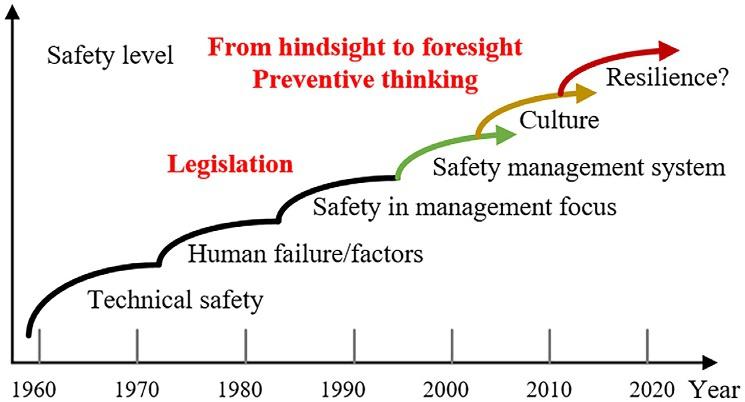
Fig.3 Majorcontributionstotheevolutionofprocesssafetypresentedin1995atthe 8thEuropeanLossPreventionsymposiuminAntwerpbyKoosVisser,processsafety pioneeratShell,andsincethenstepwiseexpandedbyHansPasman(Pasman& Fabiano,2021).

